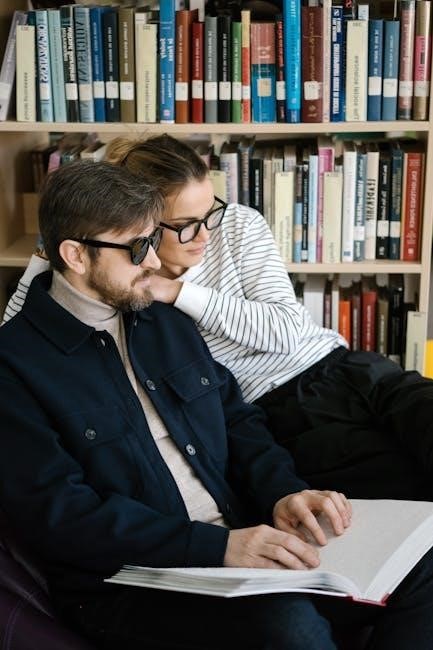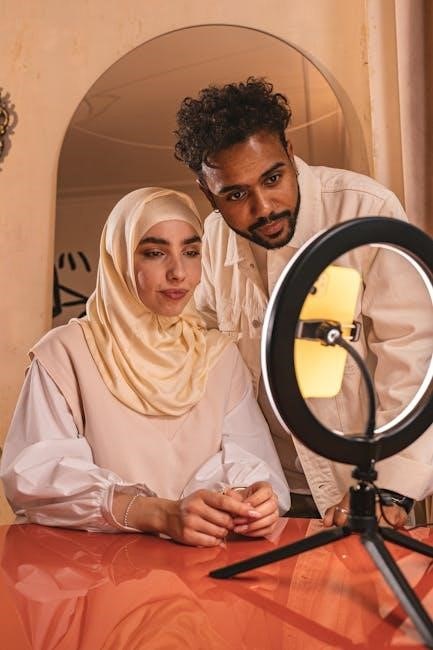Navigating ADHD together requires empathy, adaptability, and open communication. This guide offers practical strategies to foster understanding, reduce conflict, and build a resilient, loving relationship despite challenges.
Understanding the Impact of ADHD on Relationships
ADHD can significantly affect relationships, often leading to misunderstandings and frustration. Emotional dysregulation, forgetfulness, and impulsivity may strain trust and intimacy. Partners may feel unheard or unimportant due to inconsistent attention. Miscommunication and differing expectations can escalate conflicts. Both individuals with ADHD and their partners face unique challenges, requiring empathy and understanding. Recognizing these patterns is the first step toward building stronger, more resilient connections. By addressing these issues together, couples can create strategies to navigate challenges and foster a supportive, loving environment.
The Importance of Communication in ADHD-affected Relationships
Effective communication is key to thriving in ADHD-affected relationships. Active listening, empathy, and clear expression of needs help reduce misunderstandings. Using “I” statements instead of “you” statements avoids blame and fosters a supportive environment. Creating a safe space for open conversations ensures both partners feel heard and validated. Regular, structured communication can prevent feelings of neglect and confusion. By prioritizing dialogue, couples can address challenges proactively, strengthen trust, and build a more resilient and understanding relationship.
Setting Realistic Expectations for Couples with ADHD
Setting realistic expectations is crucial for couples affected by ADHD. Understanding that challenges like forgetfulness or impulsivity are part of the condition helps reduce frustration. Avoid assuming your partner can change overnight; instead, focus on gradual progress. Establish achievable goals together, celebrating small successes along the way. Unrealistic expectations can lead to disappointment, while clear, manageable ones foster growth and unity. By aligning your expectations with the realities of ADHD, you create a foundation for patience, understanding, and a stronger, more resilient relationship.
Understanding ADHD in the Context of Relationships
ADHD impacts both partners, affecting communication, intimacy, and daily interactions. Recognizing how ADHD influences each partner’s experiences, especially differences between men and women, is key to fostering mutual understanding and support.
What is ADHD and How Does it Affect Partners?
ADHD is a neurodevelopmental disorder characterized by inattention, hyperactivity, and impulsivity. It can impact relationships by affecting communication, emotional regulation, and daily responsibilities. Partners may experience frustration due to forgetfulness or impulsivity, while the individual with ADHD might feel criticized or misunderstood. This dynamic can lead to emotional distance or conflict if not addressed. Understanding how ADHD influences each partner’s experiences is crucial for fostering empathy and developing strategies to strengthen the relationship and improve mutual support.
The Difference Between ADHD in Men and Women
ADHD manifestations often differ between men and women, influencing relationship dynamics. Men typically exhibit overt symptoms like hyperactivity and impulsivity, which can lead to interrupting or acting without thinking. Women, however, may experience more inattentive symptoms, such as difficulty organizing tasks or meeting deadlines, which can be less noticeable but equally impactful. These differences can lead to distinct challenges, such as frustration over impulsivity in men or feelings of neglect due to a woman’s inattentiveness. Recognizing these variations is key to addressing ADHD effectively within a couple’s relationship and developing tailored strategies for mutual support.
Common Challenges Faced by Couples with ADHD
Couples with ADHD often face unique challenges, such as forgetfulness, impulsivity, and disorganization, which can lead to frustration and misunderstandings. Time management issues, like chronic lateness or missed commitments, can strain the relationship. Emotional dysregulation may result in sudden mood swings, affecting communication and intimacy. Additionally, inconsistency in following through on responsibilities can create an imbalance, with one partner shouldering more of the workload. These challenges require open dialogue, empathy, and collaborative problem-solving to maintain a healthy and supportive partnership.

Communication Strategies for Couples with ADHD
Effective communication is key to thriving in ADHD-affected relationships. Active listening, using “I” statements, and creating a safe space for open dialogue can foster understanding and reduce conflict.
Active Listening and Empathy in ADHD Relationships
Active listening and empathy are crucial in ADHD relationships to foster connection and understanding. Partners should focus fully on each other, avoiding distractions, and acknowledge each other’s feelings. Paraphrasing and asking clarifying questions can ensure understanding. Empathy helps bridge the gap when ADHD symptoms like forgetfulness or impulsivity arise. By truly hearing and validating each other, couples can build trust and strengthen their bond, even amidst challenges. This approach creates a safe, supportive environment for open communication and mutual growth.
Using “I” Statements to Avoid Blame
Using “I” statements is a powerful way to communicate without assigning blame, fostering healthier conversations in ADHD relationships. Instead of saying “you always forget,” try “I feel overwhelmed when plans change suddenly.” This approach focuses on personal feelings rather than accusing the partner, reducing defensiveness. It encourages open dialogue and mutual understanding, helping both partners address challenges collaboratively. By expressing needs and emotions without blame, couples can work together to find solutions, strengthening their connection and reducing conflict.
Creating a Safe Space for Open Conversations
Creating a safe space for open conversations is essential for couples navigating ADHD challenges. This involves setting aside dedicated time to talk without distractions, ensuring both partners feel heard and validated. Using respectful language and avoiding interruptions fosters trust and encourages vulnerability. Establishing ground rules, like active listening and empathy, helps prevent misunderstandings. A non-judgmental environment allows partners to express feelings and concerns freely, promoting mutual understanding and collaboration. This safe space becomes a foundation for addressing ADHD-related issues constructively and strengthening the relationship.
Emotional Regulation and Conflict Resolution
Emotional regulation is key in ADHD relationships, helping couples manage conflicts with empathy and clarity, reducing misunderstandings and fostering a supportive partnership.
Managing Emotional Triggers in ADHD Partners
Emotional triggers in ADHD partners can lead to impulsive reactions, straining relationships. Understanding these triggers is crucial for fostering empathy and patience. Couples should identify common triggers, such as stress or miscommunication, and develop strategies to address them calmly. Open dialogue and agreed-upon coping mechanisms can help mitigate emotional escalations. By creating a safe environment for expression and implementing stress-reduction techniques, couples can navigate these challenges more effectively, strengthening their bond and reducing conflict.
Practical Steps for Resolving Conflicts
Resolving conflicts in ADHD-affected relationships requires intentional strategies. Start with active listening to ensure both partners feel heard. Use “I” statements to express feelings without assigning blame. Take breaks if emotions escalate, allowing time for emotional regulation. Set clear boundaries to prevent recurring issues. Incorporate problem-solving techniques, like brainstorming solutions together. Seek professional guidance, such as couples therapy, to navigate persistent challenges. By combining empathy, communication, and structured approaches, couples can address conflicts constructively, fostering understanding and strengthening their relationship.
The Role of Forgiveness in ADHD Relationships
Forgiveness plays a vital role in ADHD relationships, helping partners move past misunderstandings and unintentional hurt. It fosters emotional healing and rebuilds trust, essential for relationship resilience. By acknowledging the unintentional nature of ADHD-related challenges, couples can practice compassion and understanding. Forgiveness doesn’t erase accountability but creates space for growth and mutual support. Regularly letting go of resentments allows the relationship to thrive, promoting a culture of empathy and shared commitment to overcoming difficulties together.

Building Intimacy and Connection
Building intimacy and connection in ADHD relationships requires intentional effort, scheduling quality time, and creating a safe space for emotional expression and shared experiences to flourish.
Overcoming Intimacy Challenges in ADHD Relationships
ADHD can bring unique intimacy challenges, such as impulsivity, distractibility, and emotional dysregulation. Couples must address these issues by creating a safe, predictable environment for connection. Scheduling regular intimate moments can help counter unpredictability, while open communication fosters emotional closeness. Using visual reminders and shared calendars can ensure both partners prioritize quality time. Building intimacy also involves empathy, understanding each other’s needs, and engaging in activities that promote bonding. By addressing these challenges proactively, couples can strengthen their emotional and physical connection, fostering a deeper, more fulfilling relationship despite ADHD-related obstacles.
Scheduling Quality Time Together
Scheduling quality time is essential for couples with ADHD, as unpredictability can disrupt spontaneous connection. By setting specific, regular dates, couples create consistency and security. Use shared calendars or apps to track plans and set reminders to avoid forgetfulness. Structured schedules help reduce frustration and ensure both partners feel prioritized. Incorporate flexibility to adapt to unexpected changes, while maintaining clear boundaries. Quality time fosters intimacy, trust, and emotional connection, helping partners thrive despite ADHD challenges. Consistent effort enhances relationship resilience and strengthens the bond between partners. Regular check-ins ensure both needs are met and priorities remain aligned.
Rekindling Romance in ADHD-affected Relationships
Rekindling romance in ADHD-affected relationships requires intentional effort and creativity. Small, consistent gestures, like surprise notes or thoughtful acts, can reignite emotional connection. Scheduled “date nights” help create predictability, reducing stress; Incorporating novelty, such as trying new activities or revisiting shared interests, can spark excitement. Prioritizing device-free, quality time fosters intimacy and focus. Celebrating small moments of connection strengthens the bond, reminding both partners of their shared joy and commitment. By addressing distractions and fostering emotional closeness, couples can revitalize their romantic relationship despite ADHD challenges.

Practical Strategies for Daily Life
Creating a structured routine, using calendars and reminders, and delegating tasks can help reduce stress and improve organization. Celebrate small wins to reinforce progress together.
Creating a Structured Routine for Couples
Establishing a consistent daily routine helps reduce chaos and anxiety for couples with ADHD. Start by creating a shared calendar for appointments and tasks, ensuring both partners stay on track. Set reminders for medications, meals, and important deadlines to avoid last-minute stress. Delegate tasks based on strengths to balance responsibilities and reduce overwhelm. Incorporate time blocks for work, leisure, and quality time together to maintain harmony. Celebrate small wins to reinforce adherence to the routine, fostering a sense of accomplishment and teamwork.
Using Tools and Reminders to Stay Organized
Utilizing digital calendars, task management apps, and reminders can significantly improve organization for couples with ADHD. Tools like Google Calendar or Trello help track appointments, deadlines, and shared responsibilities. Set recurring reminders for medications, chores, and important events to avoid forgetfulness. Sticky notes or voice reminders can serve as additional prompts. Simplify tasks by breaking them into smaller, manageable steps. Consistently reviewing and updating these tools ensures they remain effective. By leveraging technology and visual cues, couples can create a more structured and supportive environment, reducing stress and fostering accountability.
Delegate Tasks to Reduce Stress and Overwhelm
Delegating tasks can significantly reduce stress and overwhelm in ADHD-affected relationships. Identify each partner’s strengths and assign responsibilities accordingly. For example, one partner might handle scheduling while the other manages household chores. Using shared to-do lists or apps ensures accountability and visibility. Regularly review and adjust task distribution to maintain balance and prevent one partner from feeling overburdened. Open communication is key to ensuring both partners feel heard and supported. By dividing responsibilities effectively, couples can create a more manageable and harmonious daily routine.
Financial Management and ADHD
ADHD can impact financial decision-making, leading to impulsivity and disorganization. Couples must work together to create structured budgets and strategies to manage spending and reduce financial stress.
How ADHD Affects Financial Decision-making
ADHD can significantly impact financial decision-making due to challenges with impulsivity, working memory, and time management. Impulsive spending, missed bill payments, and disorganization often lead to financial stress. Difficulty in planning for the future or sticking to budgets can create tension in relationships. Additionally, time blindness and distractibility may result in overlooked financial responsibilities. Couples must address these issues collaboratively, implementing structured strategies to improve money management and reduce conflict. Open communication and shared responsibilities are key to overcoming these challenges and achieving financial stability together.
Creating a Budget Together
Creating a budget together is essential for financial harmony in ADHD-affected relationships. Start by openly discussing spending habits, income, and financial goals. Use shared tools like spreadsheets or budgeting apps to track expenses and stay aligned. Break down the budget into manageable categories, such as housing, food, and entertainment, ensuring both partners contribute to the plan. Regularly review and adjust the budget to accommodate changes and reduce impulsive spending. Celebrate small financial victories to stay motivated and reinforce teamwork in achieving long-term financial stability and mutual understanding.
Using Technology to Track Expenses
Technology can be a powerful ally in managing finances for couples with ADHD. Apps like Mint, You Need A Budget (YNAB), and Tandem allow you to track expenses in real-time, set budgeting alerts, and share financial data seamlessly. Digital tools help reduce financial stress by automating expense categorization and providing clear overviews of spending habits. Regularly syncing and reviewing these tools fosters accountability and teamwork. By leveraging technology, couples can maintain transparency, reduce impulsive purchases, and work together toward financial goals, creating a more stable and harmonious financial future.

Parenting with ADHD
Parenting with ADHD presents unique challenges, including impulsivity and organization struggles. Couples can thrive by creating structured routines, setting clear boundaries, and sharing responsibilities effectively together.
The Challenges of Co-parenting with ADHD
Co-parenting with ADHD often leads to inconsistency in discipline, forgetfulness, and emotional dysregulation, which can create chaos. Partners may struggle with differing parenting styles, leading to conflicts and misunderstandings. Time management and organization difficulties can further exacerbate stress, making it hard to maintain routines for children. Emotional impulsivity may result in reactive rather than responsive parenting, affecting boundaries and consistency. These challenges can leave both parents and children feeling frustrated, creating an unpredictable home environment that requires intentional strategies to navigate effectively and ensure stability for the family.
Setting Consistent Boundaries for Children
Setting consistent boundaries for children is crucial in ADHD-affected households to provide stability and clarity. Inconsistent discipline can confuse kids, while clear, predictable rules help them understand expectations. ADHD-related impulsivity and forgetfulness may lead to challenges in enforcing these boundaries, but tools like visual charts or apps can aid compliance. Parents should also model the behavior they expect, as children often mimic adult actions. By maintaining uniformity, parents can foster a structured environment that supports emotional and behavioral development, teaching children responsibility and self-regulation skills essential for their growth. Consistency reinforces trust and security, benefiting the entire family.
Sharing Parenting Responsibilities Effectively
Sharing parenting responsibilities effectively requires clear communication and teamwork. ADHD can create challenges, so creating a balanced plan ensures both partners contribute meaningfully. Use tools like shared calendars or apps to track tasks and deadlines. Open dialogue about strengths and weaknesses helps delegate roles fairly, preventing overwhelm; Both partners should take ownership of specific tasks to avoid frustration. Flexibility is key, as ADHD-related unpredictability may require adjustments. By working together and supporting each other, parents can maintain a stable home environment and foster a sense of collaboration, benefiting both children and the relationship. Effective sharing strengthens the partnership and reduces stress.
The Role of Therapy in ADHD Relationships
Therapy provides tailored strategies to address ADHD challenges, fostering understanding and improving communication between partners. It helps reduce misunderstandings and strengthen the relationship dynamics effectively.
Benefits of Couples Therapy for ADHD
Couples therapy tailored for ADHD offers structured strategies to address unique challenges, fostering clearer communication and empathy. It helps partners understand each other’s needs, reducing misunderstandings and conflict.
By addressing specific ADHD-related issues, therapy rebuilds trust and strengthens the relationship. It equips couples with tools to navigate daily challenges, promoting emotional balance and mutual support for long-term resilience.
Individual Therapy for ADHD Partners
Individual therapy empowers each partner to address their unique ADHD challenges, fostering personal growth and self-awareness. It helps individuals develop coping strategies, improve emotional regulation, and enhance their ability to manage stress and overwhelm.
By focusing on personal goals and needs, therapy enables partners to communicate more effectively and contribute positively to the relationship. It also provides a safe space to explore feelings and develop greater empathy, leading to a stronger, more supportive partnership.
Group Therapy and Support Groups
Group therapy and support groups provide a safe space for partners to share experiences and learn from others facing similar challenges. These settings foster a sense of community and reduce feelings of isolation. Participants gain practical advice, coping strategies, and emotional support, which can enhance their relationship dynamics. Group therapy often focuses on improving communication techniques, conflict resolution, and mutual understanding. Support groups, meanwhile, connect individuals with others who understand their struggles, promoting resilience and connection. Both options complement individual and couples therapy, offering a broader network of encouragement and growth.

Medication and Lifestyle Changes
Combine medication to manage ADHD symptoms with healthy lifestyle changes, such as balanced nutrition and regular exercise, to support overall well-being and relationship harmony.
How Medication Affects ADHD Symptoms
Medication can significantly reduce ADHD symptoms like inattention and hyperactivity by balancing brain chemistry. It improves focus, impulse control, and emotional regulation, enabling better communication and relationship dynamics. While it doesn’t cure ADHD, it helps manage symptoms, allowing couples to work more effectively on their relationship. Medication is most effective when combined with lifestyle changes and therapeutic strategies, creating a comprehensive approach to thriving together with ADHD.
Lifestyle Changes to Complement Treatment
Lifestyle adjustments play a crucial role in managing ADHD symptoms alongside medication. Regular exercise improves focus and reduces hyperactivity, while a balanced diet rich in omega-3s and vitamins supports brain health. Structured routines help create predictability, easing anxiety and improving task completion. Mindfulness practices, such as meditation, enhance emotional regulation and reduce impulsivity. Couples can also benefit from shared activities that promote bonding and stress relief. These changes, when consistently applied, complement treatment and foster a more stable, supportive environment for both partners to thrive.
Nutrition and Exercise for ADHD Management
A healthy diet and regular physical activity are essential for managing ADHD symptoms. Omega-3 fatty acids, found in fish and nuts, support brain function, while whole foods and vitamins enhance focus. Exercise, such as walking or cycling, improves concentration and reduces hyperactivity. Couples can benefit from shared meal planning and fitness routines, fostering teamwork and accountability. A balanced lifestyle not only aids in symptom management but also strengthens overall well-being, creating a more stable and supportive relationship dynamic for both partners to thrive together.

Building a Supportive Environment
Creating a ADHD-friendly home with minimal distractions, clear organization, and visual reminders fosters stability. Encouraging open support and celebrating small achievements strengthens the relationship and mutual growth.
Creating a ADHD-friendly Home Environment
Designing a home environment that supports ADHD involves minimizing distractions, organizing shared spaces, and using visual reminders. Decluttering, structured zones for tasks, and consistent routines help reduce chaos. Incorporating calming colors and ergonomic furniture can enhance focus. Open communication ensures both partners’ needs are met, fostering a sense of stability and mutual support. Small adjustments, like designated areas for keys or schedules, can make a significant difference in daily functioning and overall relationship harmony.
Supporting Each Other’s Goals and Dreams
Supporting each other’s aspirations is vital for a thriving ADHD relationship. Active listening and encouragement help partners feel heard and valued; Celebrating small victories builds confidence and reinforces progress. Breaking larger goals into manageable steps can reduce overwhelm and foster success. By being each other’s biggest cheerleaders, couples create a foundation of trust and motivation. This collaborative approach not only strengthens the relationship but also empowers both individuals to pursue their passions with renewed energy and determination.
Celebrating Small Wins Together
Celebrating small victories fosters a positive and encouraging environment in ADHD-affected relationships. Recognizing progress, no matter how minor, builds confidence and reinforces motivation. This practice helps partners feel acknowledged and valued, strengthening their bond. By acknowledging achievements together, couples create a culture of support and celebration. It also encourages accountability and teamwork, as both individuals work toward shared goals; Celebrating small wins is a powerful way to nurture resilience and joy, turning everyday challenges into opportunities for growth and connection. This mindset helps couples thrive together, embracing each step forward as a stepping stone to long-term success.
Embracing resilience and hope, couples with ADHD can build a thriving future together. Continuous growth, understanding, and support pave the way for lasting connection and shared success.
Long-term Strategies for Thriving with ADHD
Long-term success for couples with ADHD requires consistent effort, patience, and adaptability. Establishing routines, practicing emotional regulation, and maintaining open communication are key. Regular therapy sessions, both individual and couples, can provide ongoing support and guidance. Leveraging tools like planners, reminders, and shared calendars helps manage daily tasks effectively. Couples should also focus on fostering a growth mindset, celebrating small victories, and supporting each other’s goals. By combining these strategies with a commitment to understanding and empathy, couples can build a resilient and fulfilling relationship that thrives despite ADHD challenges. Continuous learning and growth are essential for long-term harmony.
Remaining Hopeful and Resilient
Thriving with ADHD as a couple requires maintaining hope and resilience. Emotional challenges can arise, but fostering a positive outlook helps navigate unpredictability. Resilience enables couples to adapt and grow together, despite setbacks. Celebrating small victories and acknowledging progress reinforces hope. Open communication and mutual support create a foundation for overcoming obstacles. By focusing on solutions rather than frustrations, couples can build a stronger, more compassionate relationship. Embracing a growth mindset and seeking inspiration from shared goals helps sustain hope and resilience, ensuring long-term success and fulfillment in the partnership.
Continuous Learning and Growth
Embracing continuous learning and growth is essential for couples navigating ADHD. Education about ADHD symptoms, strategies, and therapies fosters understanding and empathy. Both partners should commit to learning, whether through books, workshops, or therapy. This shared journey strengthens the relationship and enhances problem-solving skills. By staying informed and adaptable, couples can evolve together, addressing challenges with renewed insights. Growth fosters resilience, enabling them to thrive despite obstacles. Continuous learning ensures they remain proactive, fostering a dynamic and supportive partnership that evolves over time, leading to long-term success and fulfillment.
